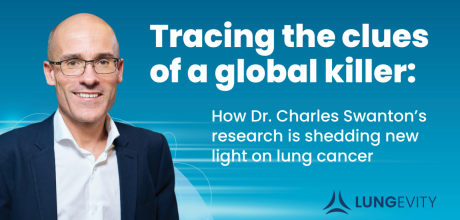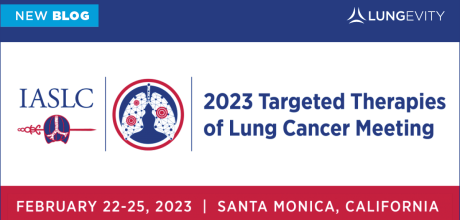Research Blogs
-
As Chief Investigator of the groundbreaking Cancer Research UK (CRUK) TRACERx study, you could say that Dr. Charles Swanton is having a moment. Launched nine years ago, TRACERx
-
The Basics of Neuroendocrine Tumors (NETs)
Our lung tissue is made of different kinds of cells, including neuroendocrine cells. If these cells develop changes in their genome, they can begin to grow out of control and -
Highlights of the 2023 Small Cell Lung Cancer IASLC Hot Topics Meeting
The first week of April definitely started with a bang! After the 2019 in-person small cell lung cancer (SCLC) meeting—convened by the International Association for the Study of -
Tackling the Biggest Challenges in Cancer
Cancer Grand Challenges is a partnership between Cancer Research UK (CRUK) and the National Cancer Institute (NCI), which funds global teams of leading researchers across various -
Real-World Drug Development at the Targeted Therapies of Lung Cancer Meeting
Each year, there is one key conference dedicated to bringing stakeholders together with the sole goal of discussing the development of treatments for thoracic cancer — the Targeted Therapies of Lung Cancer Meeting. -
Innovative Research Brings Potential New Class of Drugs for Patients with ALK-EML4 Fusion
Tumors that have the ALK protein fused with another cancer-driving protein, such as the EML4 protein, are often referred to as ALK-positive tumors. Approximately 5% of advanced-stage adenocarcinoma, a type of NSCLC, will test positive for an ALK-fusion biomarker. Treating patients with ALK-positive lung cancer with a class of drugs called tyrosine kinase inhibitors (TKIs) has been an effective approach. However, as seen in other types of lung cancers treated with TKIs, eventually the tumors develop resistance to treatment and the tumor begins to grow again. -
Researchers Make New Inroads for EGFR Exon20+ NSCLC Patients
While our bodies can have a wide range of naturally occurring, harmless mutations in different genes, some mutations, called driver mutations, are key to driving the development of cancer. In the early 2000s, EGFR was the first gene in non-small cell lung cancer (NSCLC) to be matched with a targeted therapy. -

The Viral Triple Threat: COVID-19, Flu and RSV
It is hard to believe that we’re already in November and celebrating Lung Cancer Awareness Month! In addition to recognizing LCAM, fall is also a good time to remind people
-

The 2021 Global Lung Cancer Therapy Landscape
On June 1st, 2022, LUNGevity Foundation hosted a Facebook Live to discuss our manuscript titled “ The 2021 Global Lung Cancer Therapy Landscape” published in the Journal of
-

Dr. Charles Rudin discusses key highlights from ASCO 2022
The American Society of Clinical Oncology (ASCO) Annual Meeting was held in Chicago June 3-7, 2022. Dr. Upal Basu Roy, Executive Director of Research at LUNGevity Foundation, sat down with Dr. Charles Rudin to discuss key highlights from ASCO 2022 and what they mean for the lung cancer community.
-

Progress in Targeting MET Drivers in Advanced NSCLC
MET is a gene that encodes for a MET protein. It is an important signaling protein known to play many different important roles, from the development of embryos to wound healing in -

New Options in Adjuvant Therapy for Early-Stage NSCLC
Historically, surgery has been the most effective treatment for patients with early-stage non-small cell lung cancer (NSCLC). While technological improvements, such as the







